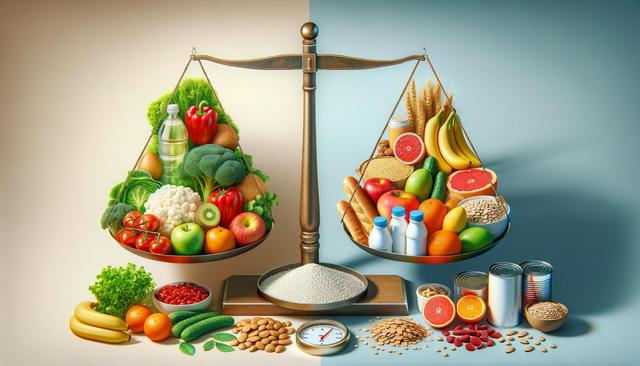Smart Eating for Kidney Health: Foods to Choose and Avoid
Managing kidney disease involves more than medication—it also requires careful attention to what you eat.

Understanding the Role of Diet in Kidney Disease
For individuals with kidney disease, what you eat can have a significant impact on how well your kidneys function. The kidneys are responsible for filtering waste and excess fluids from the blood, and when they are impaired, certain nutrients can build up in the body to harmful levels. That’s why dietary changes are often necessary—not only to help manage symptoms but also to slow the progression of the disease. A kidney-friendly diet focuses on limiting specific nutrients such as sodium, potassium, and phosphorus, while ensuring sufficient protein intake in a controlled manner. Working with a healthcare provider or registered dietitian can help tailor a nutrition plan that meets your specific needs based on the stage of your kidney disease.
Foods to Limit or Avoid with Kidney Disease
When kidneys aren’t functioning properly, they can’t remove waste products like healthy kidneys do. This means that some foods can do more harm than good. Here are some commonly restricted foods for people with kidney issues:
- High-sodium foods: These include processed foods, canned soups, deli meats, and salty snacks. Excess sodium can increase blood pressure and worsen kidney function.
- High-potassium foods: While potassium is vital for health, too much can be dangerous for those with kidney disease. Foods rich in potassium like bananas, oranges, potatoes, and tomatoes may need to be limited.
- Foods high in phosphorus: Such as dairy products, nuts, seeds, and dark-colored sodas. High phosphorus levels can lead to bone and heart problems.
- Protein-heavy meals: Overconsumption of protein can put extra strain on the kidneys. While protein is essential, moderation and quality are key.
Being mindful of food labels and portion sizes can help manage these nutrients more effectively. It’s also important to avoid over-the-counter supplements unless approved by a healthcare provider, as they may contain high levels of restricted minerals.
Kidney-Friendly Foods to Include in Your Diet
Just as there are foods to avoid, there are also plenty of options that support kidney health. These foods are low in sodium, potassium, and phosphorus, yet still provide essential nutrients. Examples include:
- Low-potassium fruits: Apples, berries, grapes, and pineapple are excellent choices.
- Vegetables: Green beans, cabbage, and cauliflower are typically safe options when cooked appropriately.
- Lean protein sources: Egg whites, skinless poultry, and fish in moderation offer quality protein with less waste buildup.
- Grains: White rice, pasta, and refined breads are often lower in phosphorus than whole grain versions, making them suitable in controlled amounts.
Hydration is also important, but fluid intake may need to be controlled depending on the stage of kidney disease. Always consult with your care team before making dietary changes.
Individualized Nutrition: One Size Doesn’t Fit All
Kidney disease affects people differently, and dietary needs can vary based on many factors such as the stage of the disease, presence of other health conditions like diabetes or hypertension, and lab results. For example, someone on dialysis may have different nutritional requirements than someone in the early stages of kidney disease. Personalized meal planning is crucial to ensure that you’re getting enough of the right nutrients without overloading your kidneys. A registered dietitian can help assess your specific needs and recommend meal plans, appropriate portion sizes, and food substitutions that align with your lifestyle and preferences.
Furthermore, cultural and personal preferences should be considered in any dietary plan. This makes the diet more sustainable and enjoyable in the long term. The key is not to follow a rigid set of rules, but to understand your body’s signals and make informed choices with the support of medical professionals.
Tips for Managing Your Diet Effectively
Successfully managing kidney disease through diet involves more than just knowing what to eat and avoid. It also requires practical strategies for everyday living. Here are some helpful tips:
- Plan meals ahead: Preparing meals in advance can help you stay within your dietary limits and avoid impulsive eating.
- Cook at home: Homemade meals give you full control over ingredients and portion sizes.
- Use herbs and spices: These can enhance flavor without adding sodium.
- Keep a food diary: Tracking what you eat can help identify patterns and areas for improvement.
- Read labels carefully: Pay attention to sodium, potassium, phosphorus, and protein content on packaged foods.
Consistency is key. While occasional indulgences may be allowed depending on your condition, maintaining a balanced approach to eating will yield the most benefits over time.
Conclusion: Supporting Kidney Health Through Mindful Eating
Living with kidney disease means making thoughtful choices about every aspect of your health, including your diet. Understanding which foods to enjoy and which to limit can empower you to take control of your condition and improve your quality of life. While dietary changes can be challenging at first, they become easier with practice, planning, and professional guidance. By focusing on a personalized, kidney-friendly diet, you can better support your overall health and work towards maintaining kidney function for as long as possible.